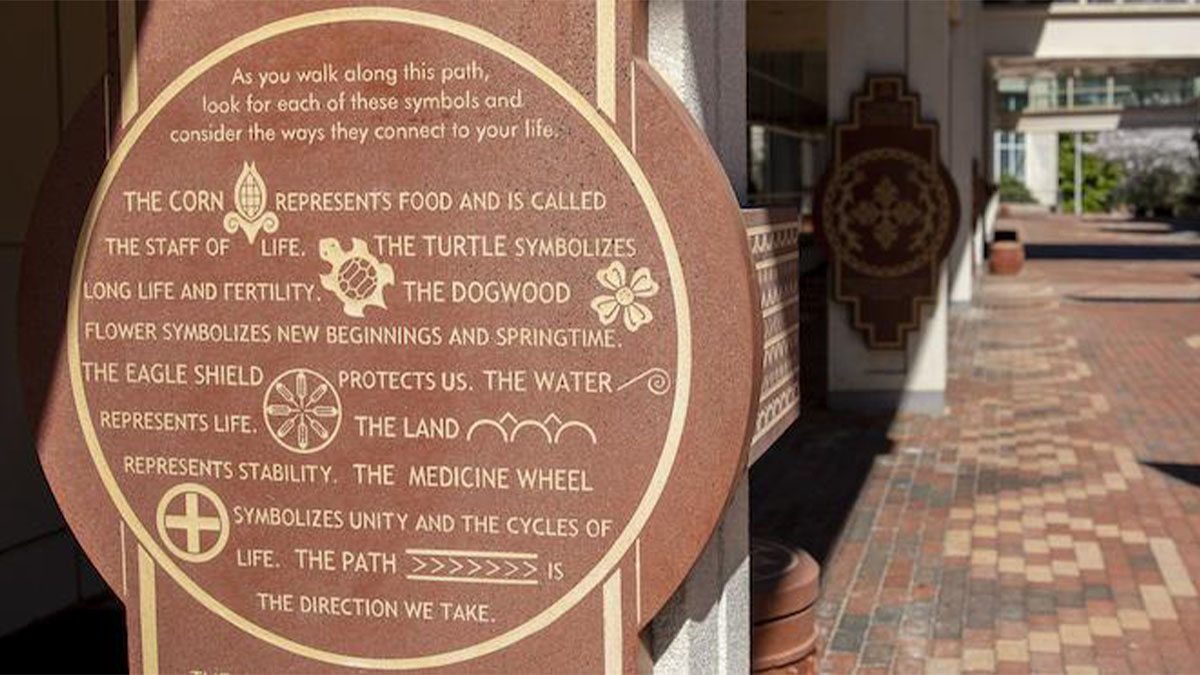University proclamation recognizes Indigenous Peoples’ Day
The proclamation acknowledges that the University is built on the homelands and villages of the region’s Indigenous peoples, who were the land’s first inhabitants and caretakers.

University leaders and the UNC American Indian Center issued a proclamation today recognizing the second Monday in October as Indigenous Peoples’ Day.
The proclamation acknowledges that the University is built on the homelands and villages of the region’s Indigenous peoples — historically the Enos, Occaneechis, Shakoris and Sissipahaws — who were the land’s first inhabitants and caretakers.
“I fully support our proclamation recognizing Indigenous Peoples’ Day,” said Chancellor Kevin M. Guskiewicz. “We must stand together to honor their significant contributions to our community, both past and present. This recognition also serves as an opportunity to celebrate Indigenous Peoples’ thriving cultures, traditions and values that have helped make Carolina what it is today.”
The idea of Indigenous Peoples’ Day was first proposed in 1977 by the International Conference on Discrimination Against the Indigenous Population in the Americas.
North Carolina is home to eight state-recognized tribes: the Coharie Indian Tribe, the Eastern Band of Cherokee Indians, the Haliwa-Saponi Indian Tribe, the Lumbee Tribe of North Carolina, the Meherrin Indian Tribe, the Occaneechi Band of the Saponi Nation, the Sappony and the Waccamaw Siouan Tribe.
Along with the American Indian Center, Carolina is home to the Carolina Indian Circle, the First Nations Graduate Circle, the Native American Law Students Association, and the Alpha Pi Omega Sorority Inc. and the Phi Sigma Nu Fraternity Inc., which serve Indigenous students on campus. The College of Arts and Sciences’ American studies department offers the American Indian and Indigenous studies major and graduate degrees.
The complete text of the proclamation, “Recognition of Indigenous Peoples’ Day, University of North Carolina At Chapel Hill, 2021,” reads as follows:
WHEREAS, the University of North Carolina at Chapel Hill (the University) is built on the homelands and villages of the Indigenous Peoples of this region historically the Enos, Occaneechis, Shakoris, and Sissipahaws who were the first inhabitants and caretakers of this land; and
WHEREAS, it is our collective responsibility to recognize and honor the land that is currently home to the University as historically aboriginal territories and Indigenous lands; and
WHEREAS, the University recognizes and values the many contributions made to technology, medicine, science, philosophy, arts in our society and our community through Indigenous Peoples’ history, culture, knowledge and labor; and
WHEREAS, the University benefited from the sale of land originally belonging to Native nations; and
WHEREAS, many who live, study or work in this space are settlers, immigrants or descendants of those who originally occupied this land, or forcefully were brought to this land; and
WHEREAS, North Carolina is home to eight state-recognized tribes which are the Coharie Indian Tribe, the Eastern Band of Cherokee Indians, the Haliwa-Saponi Indian Tribe, the Lumbee Tribe of North Carolina, the Meherrin Indian Tribe, the Occaneechi Band of the Saponi Nation, the Sappony, and the Waccamaw Siouan Tribe; and
WHEREAS, the University is home to the American Indian and Indigenous Studies major in the American Studies Department of the College of Arts and Sciences offering majors, minors and graduate degrees; and
WHEREAS, the University is home to the UNC American Indian Center, the Carolina Indian Circle, the First Nations Graduate Circle, the Native American Law Student Association, Alpha Pi Omega Sorority, Inc., and the Phi Sigma Nu Fraternity, Inc. serving Indigenous students on campus; and
WHEREAS, the idea of Indigenous Peoples’ Day was first proposed in 1977 by the International Conference on Discrimination Against the Indigenous Population in the Americas; and
WHEREAS, the University is home to the UNC American Indian Center, the Carolina Indian Circle, Alpha Pi Omega Sorority, Inc., and the Phi Sigma Nu Fraternity, Inc. serving indigenous students on campus;
NOW, THEREFORE, the UNC American Indian Center and the University of North Carolina at Chapel Hill, does hereby recognize the second Monday of October Indigenous Peoples’ Day at UNC-Chapel Hill, and commend its observance to all members of the University community.
Kevin M. Guskiewicz
Chancellor, University of North Carolina at Chapel HillJoseph Jordan
Vice provost, academic and community engagementUNC American Indian Center staff and consulting team




